

This Is What Your Feelings Look Like, According To Science. It's one of the most fundamental questions underpinning the human experience: is your experience of the world the same as mine?

Do we feel the same happiness? Hunger? Love? Although various philosophers have attempted to tackle the question, from a scientific standpoint the answer has remained mysterious. But a new study by a team of researchers from three Finnish universities has revealed that, when it comes to our feelings and emotions, people may not be as unique as we like to think.
Using the results of an online survey, researchers from Turku University, Aalto University, and the University of Tampere have revealed the connection between 100 conscious, subjective feelings and physical sensations in the body. The study took the form of a three-stage, internet-based survey, in which over 1,000 participants answered questions about how they perceive various feelings. How To Look And Feel Healthier In One Month, According To Science. Shutterstock Detox in a day!
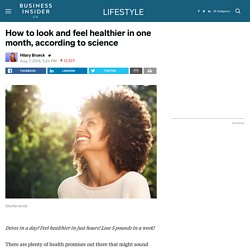
Feel healthier in just hours! Lose 5 pounds in a week! Can You Rewire Your Brain? Maybe. (It's Tricky. Be Careful.) Defensive pessimism. Defensive pessimism is a cognitive strategy identified by Nancy Cantor and her students in the mid-1980s.[1] Individuals use defensive pessimism as a strategy to prepare for anxiety-provoking events or performances.
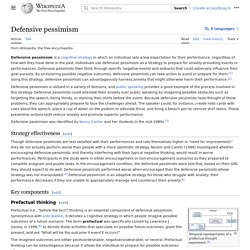
When implementing defensive pessimism, individuals set low expectations for their performance, regardless of how well they have done in the past. Defensive pessimists then think through specific negative events and setbacks that could adversely influence their goal pursuits. By envisioning possible negative outcomes, defensive pessimists can take action to avoid or prepare for them.[2] Using this strategy, defensive pessimists can advantageously harness anxiety that might otherwise harm their performance.[3] Defensive pessimism is utilized in a variety of domains, and public speaking provides a good example of the process involved in this strategy. Strategy effectiveness[edit] Key components[edit] Prefactual thinking[edit] Anxiety[edit] Relationship between daily suicide counts and temperature in England and Wales. Crossref Citations This article has been cited by the following publications.
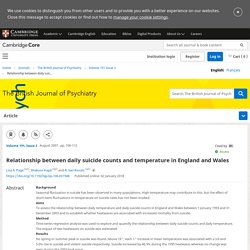
This list is generated based on data provided by CrossRef. Almendra, Ricardo Loureiro, Adriana Silva, Giovani Vasconcelos, João and Santana, Paula 2019. Short-term impacts of air temperature on hospitalizations for mental disorders in Lisbon. NPR Choice page. The Dark Core of Personality. Maîtriser les sept âges de l’appétit pour vieillir en restant en bonne santé. New study says graduate students' mental health is a "crisis" A new scale for assessing wisdom based on common domains and a neurobiological model: The San Diego Wisdom Scale (SD-WISE). - PubMed - NCBI.
Why Are You Always Tired? Work organization and mental health problems in PhD students. Highlights One in two PhD students experiences psychological distress; one in three is at risk of a common psychiatric disorder.

The prevalence of mental health problems is higher in PhD students than in the highly educated general population, highly educated employees and higher education students. Work and organizational context are significant predictors of PhD students’ mental health. Abstract Research policy observers are increasingly concerned about the potential impact of current academic working conditions on mental health, particularly in PhD students. Keywords Mental health; GHQ-12; Work organization; Psychosocial working conditions; PhD students Choose an option to locate/access this article: How Your College Friendships Help You – Or Don’t. College students spend a tremendous amount of time with their friends.

One estimate suggests that the average college student spends only 15 hours a week in class but 86 hours a week with his or her friends. But how much do we understand about the role friendships play and how they influence students both academically and socially? Assortative mating on educational attainment leads to genetic spousal resemblance for polygenic scores. A Department of Economics, University of East Anglia, Research Park, Courtyard B, Norwich NR4 7TJ Norwich, England, United Kingdomb Department of Biological Psychology, VU University, van der Boechorstraat 1, 1081 BT Amsterdam, The Netherlandsc Max Planck Institute for Psycholinguistics, Wundtlaan 1, 6525 XD Nijmegen, The Netherlands Received 7 June 2016, Revised 25 July 2016, Accepted 14 August 2016, Available online 29 August 2016 Choose an option to locate/access this article: Check if you have access through your login credentials or your institution Check access Get rights and content.

Bientôt, chaque "like" sur Facebook vous coûtera 10 centimes. Ça a marché, vous avez cliqué !

Autant vous prévenir tout de suite, le titre de cet article est 100% faux. Pourtant, ça ne l'empêcherait sans doute pas d'être abondamment partagé sur les réseaux sociaux. 6 surprising downsides of being extremely intelligent. You might think life would be easier, happier, and infinitely more fulfilling if only you could rack up a few more IQ points.
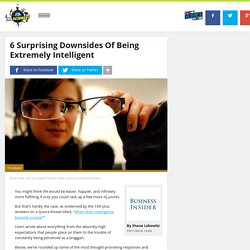
But that's hardly the case, as evidenced by the 100-plus answers on a Quora thread titled, "When does intelligence become a curse? " Users wrote about everything from the absurdly high expectations that people place on them to the trouble of constantly being perceived as a braggart. Below, we've rounded up some of the most thought-provoking responses and explained the science behind them. 1. Introverts vs Extroverts. Psynect #3 - PAS D'AVENIR POUR LES FILLES ? Sexisme et Justification du Système. Does Your School Matter? The Trolley Dilemma: Would You Kill One Person To Save Five? Imagine you are standing beside some tram tracks.
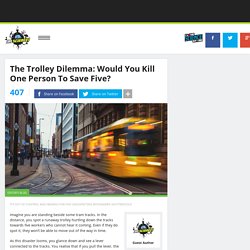
In the distance, you spot a runaway trolley hurtling down the tracks towards five workers who cannot hear it coming. Apollo Robbins: The art of misdirection. The Power of Positive Memory Recall – Neuroscience News. Stress-induced depression can be overcome in mice by inducing the firing of neurons that had been active during a positive experience.
Chronic stress can cause symptoms of anxiety and depression in many organisms, including mice and humans. A team of RIKEN researchers has discovered that stimulating brain cells that had previously fired during a positive experience blocks the stress-induced onset of depressive behaviors in mice. Test de personnalité gratuit, descriptions de types, conseils relationnels et de carrière. Same-Sex Parenting Has No Negative Impact On Children's Health. Same-sex parenting has been a contentious issue since the 1980s, but the struggle for marriage equality has brought the issue back to the forefront of public debate. Scientifically speaking, though, there’s not much of a debate.
No peer-reviewed study has ever found that gay parents in stable relationships are a disadvantage to their kids. The latest study, by an international team of researchers from the U.S. and the Netherlands, looked at 190 intact families (95 different-sex, 95 female same-sex parents) with at least one child between the age of 6 and 17. They looked at the children’s general health, emotional difficulties, coping behavior, and learning behavior, and discovered no differences between children raised by same-sex or different-sex parents.
Du lycée au bureau, que deviennent nos réseaux. Judson Brewer: Une façon simple de chasser ses mauvaises habitudes. Do these eight things and you will be more creative and insightful, neuroscientists say. Changing your environment can encourage creativity and insightful thinking. (Photo/shutterstuck,dreamtime,Bigstock) Tests of human intelligence show that even as IQ, the measure of our analytical thinking skills, appears to be on the rise, our more expansive, creative thinking skills may be on the wane as our hyper-busy world promotes more narrow, analytical thought. Neuroscientist John Kounios, a professor of psychology at Drexel University and co-author, along with colleague Mark Beeman, of The Eureka Factor, studies how creativity and insightful thinking begin in the brain.
7 Reasons To Be Proud Of Being A Night Owl. It's been said that early birds get the worm, but night owls also reap a whole lot of benefits just by being who they are. And it's time they got some praise. Please don't get us wrong: We are definitely sleep advocates. And it is very important for you to make sure that you get the right amount of sleep (seven to nine hours for the average adult) every single day in order to stay healthy. This is not permission to stay up late and skimp on sleep. 8 Simple Tips To Stay Motivated.
Lying. Modern parenting may hinder brain development, research suggests. Social practices and cultural beliefs of modern life are preventing healthy brain and emotional development in children, according to an interdisciplinary body of research presented recently at a symposium at the University of Notre Dame. "Life outcomes for American youth are worsening, especially in comparison to 50 years ago," says Darcia Narvaez, Notre Dame professor of psychology who specializes in moral development in children and how early life experiences can influence brain development.
Sandra Aamodt: Why dieting doesn't usually work. According To This Sleep Expert, Work And School Shouldn't Start Until After 10am. Sleep is money for the brain, and young adults are accruing as much as 10 hours of sleep debt each week. How sugar affects the brain - Nicole Avena. Dr. Avena’s website has links to new research and articles about the effects of sugar on the brain and behavior, and how this can influence body weight.Want to learn more about the adverse effects of sugar?
Read Food Junkie, Dr. The best music to listen to for optimal productivity, according to science. What a difference a word can make. The Science Of ‘Hangry’, Or Why Some People Get Grumpy When They’re Hungry. A seulement 22 ans, je refuse de consacrer ma vie à quelqu'un d'autre VIE DE COUPLE - Je crois dur comme fer à l'amour. Le vrai. Et oui, je suis persuadé qu'il y a quelqu'un, quelque part, qui m'attend et m'en mettra plein la vue, à tel point que je me demanderai comment j'ai fait pour m'intéresser à qui que ce soit d'autre. Il y a un homme quelque part pour moi, avec qui je fêterai une multitude d'anniversaires, de Saint-Valentin et autres dates butoirs. Il est un homme avec qui je surmonterai les obstacles, la distance et les coups durs, en sachant que rien ne changera jamais.
This Is Why You Will Lose Your Argument. No S#!t Study: Scientists Find That Conspiracy Theorists Will Pretty Much Believe Anything You Tell Them. Are You a Leader? Check for Dopamine Transporter Gene DAT1Trending. Psychopaths are better at appearing genuine when they pretend to be fearful or remorseful. From Chimps To Bees And Bacteria, How Animals Hold Elections. Your Personality Could Influence How Well You Fight Disease. The Truth About Addiction: We’re All Junkies Now.
On “Geniuses” and Gender Gaps. What's Up With That: You Hate Pictures of Yourself. Dan Gilbert: The psychology of your future self. Matt Cutts: Try something new for 30 days. Meg Jay: Why 30 is not the new 20. Carol Dweck: The power of believing that you can improve.
10 Bizarre Human Behaviors That Have Little Explanation. Nicholas Christakis: The hidden influence of social networks. Sam Richards: A radical experiment in empathy. Philip Zimbardo: The psychology of time. Joachim de Posada: Don't eat the marshmallow! Dan Gilbert: The surprising science of happiness.
Heribert Watzke: The brain in your gut. Rebecca Saxe: How we read each other's minds. Jessa Gamble: Our natural sleep cycle. Paul Bloom: Can prejudice ever be a good thing? Cartographier le corps émotionnel. Tali Sharot: The optimism bias. Shawn Achor: The happy secret to better work. Dan Gilbert: Why we make bad decisions. What We Fear : TED Radio Hour. It May Be Possible To Train Your Brain To Prefer Healthier Food. Why Are Humans Altruistic? Are Your Bacteria Making You Fat? No, You're Not Entitled To Your Opinion. Imaging Intercourse, 1493. How Much Sleep Do You Really Need? Friends share similar DNA, study finds. People Would Rather Experience An Electric Shock Than Be Alone With Their Thoughts. Aldo Naouri : «Remettre l'enfant à la bonne place»
Women Outrank Men in Pulling Rank.